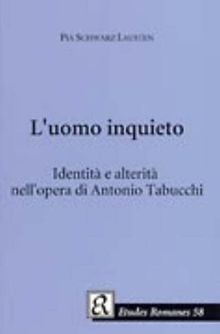
TEXT IN ITALIAN. The work of A Tabucchi, one of Italy's greatest contemporary writers, is imbued with the topic of individual identity. His texts query the self-perception, the relation with the Other and the relation with the historical and cultural world while expressing at all these levels an experience of dissolution: the self is fragmented and fragile; the Other is always absent and missed, and instead of being engaged in the present world, the subject lives in an intangible reality that does not make any sense. This profound existential anxiety and the weakening of identity are emphasised by the very way of narrating of Tabucchi which is disconnected, enigmatic and full of silences. The book by Pia Schwarz Lausten describes various manifestations of the above-mentioned experience through the textual analysis of a series of figures and motives such as memory and absence, reversal and multiplicity, the said and the unsaid, history and commitment. Some of these motives involve on the one hand existential and philosophical aspects, and on the other esthetical and literary values. The analysis is based on two theoretical perspectives that in different ways describe an overcoming of a classical subjectivity in favour of an idea of which the Other or Alterity is an essential element to the definition of individual identity: M. Bachtin's concept of "dialogism" and G. Vattimo's "weak thought". The former serves to define the narrating subject in Tabucchi's texts characterised by different discourse levels and others' words. The latter concept describes the position of the subject of post-modernity determined by a weakening of the strong structures of modern thought. The book is written in Italian.